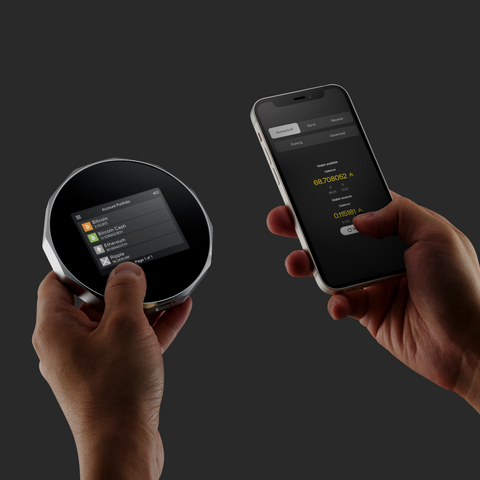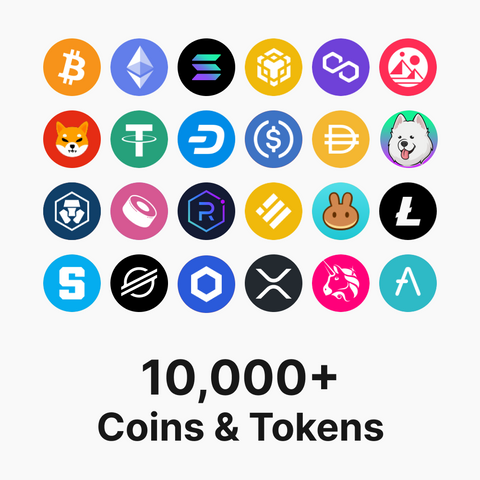A Comprehensive Exploration of Decentralized Wallets
Decentralized wallets, unlike their centralized counterparts, operate without a central authority. This autonomy means you have full control over your funds, aligning with the core principles of cryptocurrency: enhanced security and privacy.
The rise in popularity of decentralized wallets is a response to the growing need for secure crypto management. Centralized wallets, managed by third parties, often expose your assets to risks and security breaches. Decentralized wallets mitigate these risks by giving you direct control, and eliminating third-party involvement. Understand the meaning and significance of decentralized wallets as we delve deeper into how they safeguard your cryptocurrency assets.
Centralized vs. Decentralized Crypto Wallets: A Comparative Analysis
Centralized Wallets
- Operation: Centralized wallets function under a central authority or third-party organization. They facilitate your financial transactions, acting as a mediator between you and your assets. Specifically, centralized wallets are similar to exchange wallets like Binance or OKX. They function under a central authority or third-party organization, facilitating financial transactions as a mediator between you and your assets.
- User Experience: These wallets are renowned for their ease of use, offering a familiar interface and user-friendly features, making them accessible even to beginners in the cryptocurrency world.
- Security Concerns: A significant downside is their vulnerability to security breaches. Since your funds are managed by an intermediary, there's an inherent risk. You're essentially entrusting your assets to another entity, which may become a target for cyber-attacks, potentially compromising the safety of your funds.
- DeFi Wallet Consideration: Traditional centralized wallets often lack certain functionalities desired by users engaged in decentralized finance (DeFi). Those looking for DeFi solutions might find centralized wallets limiting in terms of features and autonomy. DeFi refers to financial services provided by blockchain technology, often without the need for traditional intermediaries like banks. Examples include borrowing or lending on platforms like Compound or Aave, earning interest on decentralized stablecoins like DAI, and trading assets on decentralized exchanges like Uniswap or SushiSwap.
Decentralized Wallets
- Operation: In contrast, decentralized wallets operate independently of any central authority. They grant you complete control over your private keys and, consequently, your funds. This setup aligns with the ethos of cryptocurrency, which emphasizes user empowerment and self-sovereignty in financial matters.
- Examples of Decentralized Wallets: Decentralized wallets come in two forms: software wallets, such as Trust Wallet, MetaMask, and Exodus, are digital wallets accessible through web browsers or mobile apps, offering ease of use and accessibility. Hardware wallets, such as SecuX, Ledger Nano S, and Trezor, are physical devices that store cryptocurrency offline, providing enhanced security but may be less convenient for some users.
- Security and Autonomy: Although they might be more complex to use initially, decentralized wallets offer enhanced security. Your assets are directly under your control, reducing the risk of breaches associated with third-party control. This autonomy is a cornerstone of the cryptocurrency philosophy, stressing the importance of decentralization, security, and personal control.
- DeFi Wallet Benefits: Decentralized wallets, such as Trust Wallet and MetaMask, and hardware options like SecuX, Ledger Nano S, and Trezor, are essential for engaging with DeFi. They provide the necessary security and autonomy required by DeFi users, allowing them to maintain full control over their funds and participate in various decentralized finance protocols. From swapping tokens on decentralized exchanges to providing liquidity, yield farming, and participating in governance, a decentralized wallet is a fundamental tool for navigating the DeFi landscape.
Understanding the distinct characteristics and implications of both centralized and decentralized wallets, particularly in the context of DeFi, is crucial. This knowledge allows you to make informed decisions based on your personal needs and preferences. Whether your priority lies in security, ease of use, or active participation in decentralized finance, choosing the right type of wallet is a pivotal step in your cryptocurrency journey.
What Is a Decentralized Wallet, and What Are Their Advantages?
- Enhanced Security: Decentralized wallets significantly elevate the security of your crypto assets. They eliminate risks commonly found in centralized systems, such as single points of failure and vulnerabilities to hacking.
- Complete Control Over Private Keys: As a user, you hold your private keys, meaning you have direct control over your funds. This reduces the attack vectors that hackers can exploit, making your wallet less susceptible to breaches.
-
Decentralized Security: The very essence of a decentralized wallet is its security feature. By design, these wallets decentralize the risk, ensuring your funds remain safe and secure, a stark contrast to the centralized models where funds are often pooled and more exposed.
- User Autonomy: Decentralized wallets grant you unparalleled control over your financial assets. This autonomy is a significant shift from the traditional reliance on third parties for managing transactions and accessing funds.
- Complete Financial Sovereignty: You have the ultimate authority over your cryptocurrency holdings. This means no intermediary can freeze, delay, or scrutinize your transactions.
-
Empowerment in Decision-Making: This level of autonomy empowers you to make independent financial decisions, a fundamental aspect of the decentralized finance movement.
- Resistance to Censorship: A standout feature of decentralized wallets is their inherent resistance to censorship. This means your transactions are free from external control and interference.
- Financial Freedom: These wallets offer a level of financial freedom not possible in systems where centralized entities can impose restrictions or controls.
-
Unrestricted Access: In regions with stringent financial regulations or in scenarios where traditional banking systems fail, decentralized wallets serve as a vital tool for maintaining access to funds and carrying out transactions without hindrance.
- Global Accessibility: Decentralized wallets are not bound by geographical limitations, offering global accessibility to users. This makes them a powerful tool for individuals in all parts of the world.
- Breaking Down Borders: With decentralized wallets, you can manage your crypto assets seamlessly, irrespective of your physical location. This is especially beneficial for those in regions with limited access to traditional banking systems.
- Universal Participation: This feature democratizes financial participation, allowing people from diverse backgrounds and locations to engage in the global crypto economy.
The advantages of decentralized wallets become particularly evident in real-world scenarios. In regions with stringent financial controls or unstable economic environments, decentralized wallets provide a means to navigate the economic landscape with greater autonomy and security. They represent not just a technological advancement but a shift towards financial empowerment and inclusion.
Step-by-Step Guide: How to Use a Decentralized Wallet
Let's now embark on a practical journey to utilizing a decentralized wallet with a step-by-step guide showcasing SecuX's decentralized hardware wallet:
-
Select Your SecuX Wallet: Choose a SecuX decentralized hardware wallet that ensures compatibility with your intended cryptocurrencies.

-
Set Up Your Wallet: Follow on-screen instructions to set up your wallet, including generating or inputting secure private keys and creating a backup. This initial setup is critical for ensuring the security and recoverability of your funds.

-
Add Funds: Transfer cryptocurrency securely to your decentralized SecuX wallet. Utilize 10,000+ coins and tokens with SecuX. The secure software allows for exchanges or wallet transfers while mitigating the risk of unauthorized access.

- Initiate Transactions: Use your wallet to send or receive funds, enjoying decentralized security benefits. Thoroughly verify transaction details before confirming to prevent errors.
- Safety Tips: Keep private keys secure by storing them confidentially. Regularly update wallet software and firmware for the latest security features and improvements. Additionally, utilizing hardware wallets like XSEED, which securely records your seed phrase, offers an extra layer of protection against theft, loss, or damage. This ensures that your funds are recoverable even in the worst-case scenarios.
Embracing the Future of Crypto Security
Understanding and adopting decentralized wallets are pivotal steps in securing your crypto assets. Their advantages in terms of security, autonomy, and global accessibility make them a cornerstone in the evolving landscape of cryptocurrency.
Embrace the future of crypto security with confidence. SecuX stands out as a reliable solution for decentralized wallets. All SecuX cold wallets operate decentralized, ensuring you retain control of your digital assets.
Ready to secure your crypto? Explore SecuX's range of decentralized wallets at SecuX Shop.

1 comment
Jack Farris
September 11, 2024Great insights on decentralized wallet! Impressed by the in-depth analysis, advantages, focus on crypto security, and helpful guides. Very informative and well-structured article.